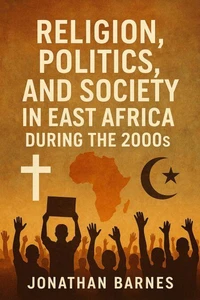The Conflict Between Indigenous and Colonial Forms of Administration in Africa
Par :Formats :
Disponible dans votre compte client Decitre ou Furet du Nord dès validation de votre commande. Le format ePub est :
- Compatible avec une lecture sur My Vivlio (smartphone, tablette, ordinateur)
- Compatible avec une lecture sur liseuses Vivlio
- Pour les liseuses autres que Vivlio, vous devez utiliser le logiciel Adobe Digital Edition. Non compatible avec la lecture sur les liseuses Kindle, Remarkable et Sony
 , qui est-ce ?
, qui est-ce ?Notre partenaire de plateforme de lecture numérique où vous retrouverez l'ensemble de vos ebooks gratuitement
Pour en savoir plus sur nos ebooks, consultez notre aide en ligne ici
- FormatePub
- ISBN8230367758
- EAN9798230367758
- Date de parution10/01/2025
- Protection num.pas de protection
- Infos supplémentairesepub
- ÉditeurIndependently Published
Résumé
This study delves into the multifaceted legacy of colonialism in Africa, examining its profound and lasting impact on the political, economic, social, and cultural landscapes of the continent. By analyzing the structures imposed by European powers during the colonial period and their effects on African governance, economies, and identities, the research highlights the complexities African nations face in navigating post-independence realities.
Colonial powers not only extracted resources and imposed artificial borders but also implemented systems of governance that disrupted indigenous authority and social cohesion. These legacies have led to enduring challenges in the form of ethnic and regional divisions, economic dependency, political instability, and weakened institutions. Drawing on historical case studies from Nigeria, Kenya, South Africa, and other African nations, the study explores the enduring consequences of these colonial policies, such as the struggle for economic independence, the persistence of artificial borders, and the marginalization of indigenous governance structures.
It also examines the role of the international community, including former colonial powers, the United States, the Soviet Union, and international financial institutions, in shaping Africa's post-colonial trajectory. Despite these challenges, the chapter offers a path forward, emphasizing the importance of reclaiming African cultural identities, strengthening regional cooperation, and building political systems that prioritize the needs of local populations over external interests.
The work concludes that while colonialism's legacy is undeniable, African nations continue to demonstrate resilience and agency in their quest for sovereignty, development, and social justice in the 21st century.
Colonial powers not only extracted resources and imposed artificial borders but also implemented systems of governance that disrupted indigenous authority and social cohesion. These legacies have led to enduring challenges in the form of ethnic and regional divisions, economic dependency, political instability, and weakened institutions. Drawing on historical case studies from Nigeria, Kenya, South Africa, and other African nations, the study explores the enduring consequences of these colonial policies, such as the struggle for economic independence, the persistence of artificial borders, and the marginalization of indigenous governance structures.
It also examines the role of the international community, including former colonial powers, the United States, the Soviet Union, and international financial institutions, in shaping Africa's post-colonial trajectory. Despite these challenges, the chapter offers a path forward, emphasizing the importance of reclaiming African cultural identities, strengthening regional cooperation, and building political systems that prioritize the needs of local populations over external interests.
The work concludes that while colonialism's legacy is undeniable, African nations continue to demonstrate resilience and agency in their quest for sovereignty, development, and social justice in the 21st century.
This study delves into the multifaceted legacy of colonialism in Africa, examining its profound and lasting impact on the political, economic, social, and cultural landscapes of the continent. By analyzing the structures imposed by European powers during the colonial period and their effects on African governance, economies, and identities, the research highlights the complexities African nations face in navigating post-independence realities.
Colonial powers not only extracted resources and imposed artificial borders but also implemented systems of governance that disrupted indigenous authority and social cohesion. These legacies have led to enduring challenges in the form of ethnic and regional divisions, economic dependency, political instability, and weakened institutions. Drawing on historical case studies from Nigeria, Kenya, South Africa, and other African nations, the study explores the enduring consequences of these colonial policies, such as the struggle for economic independence, the persistence of artificial borders, and the marginalization of indigenous governance structures.
It also examines the role of the international community, including former colonial powers, the United States, the Soviet Union, and international financial institutions, in shaping Africa's post-colonial trajectory. Despite these challenges, the chapter offers a path forward, emphasizing the importance of reclaiming African cultural identities, strengthening regional cooperation, and building political systems that prioritize the needs of local populations over external interests.
The work concludes that while colonialism's legacy is undeniable, African nations continue to demonstrate resilience and agency in their quest for sovereignty, development, and social justice in the 21st century.
Colonial powers not only extracted resources and imposed artificial borders but also implemented systems of governance that disrupted indigenous authority and social cohesion. These legacies have led to enduring challenges in the form of ethnic and regional divisions, economic dependency, political instability, and weakened institutions. Drawing on historical case studies from Nigeria, Kenya, South Africa, and other African nations, the study explores the enduring consequences of these colonial policies, such as the struggle for economic independence, the persistence of artificial borders, and the marginalization of indigenous governance structures.
It also examines the role of the international community, including former colonial powers, the United States, the Soviet Union, and international financial institutions, in shaping Africa's post-colonial trajectory. Despite these challenges, the chapter offers a path forward, emphasizing the importance of reclaiming African cultural identities, strengthening regional cooperation, and building political systems that prioritize the needs of local populations over external interests.
The work concludes that while colonialism's legacy is undeniable, African nations continue to demonstrate resilience and agency in their quest for sovereignty, development, and social justice in the 21st century.

















